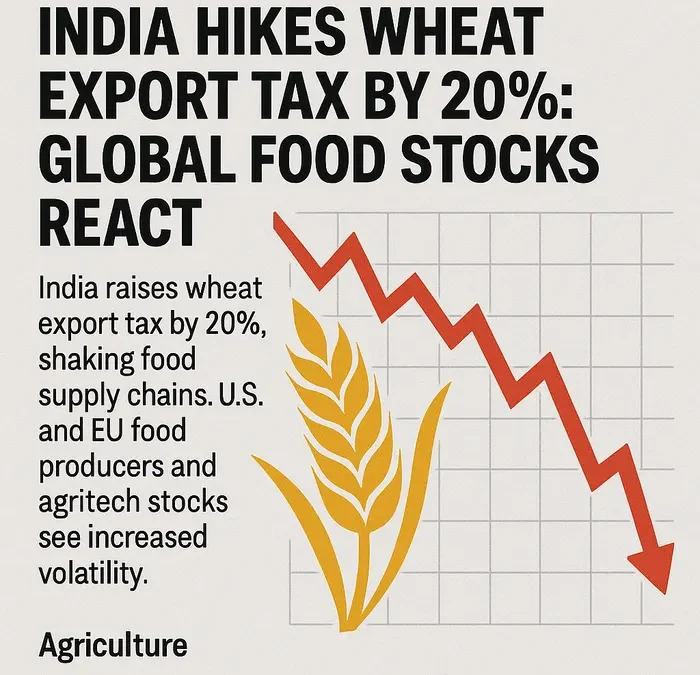India Raises Wheat Export Tax by 20%: U.S. & EU Food Stocks React as Prices Spike
India’s Wheat Policy Shakes Global Agriculture Markets
In a surprise policy shift, the Government of India has imposed a 20% export tax on wheat, effective immediately. This decision aims to stabilize domestic food inflation following a weaker-than-expected wheat harvest caused by erratic weather and El Niño effects.
The move sent global wheat futures surging and raised immediate concerns over food security in South Asia, the Middle East, and Africa. Investors reacted swiftly, pushing U.S. and European food-related stocks into volatile territory
Wheat Prices Surge on Global Markets
After the announcement:
- Chicago Board of Trade (CBOT) Wheat Futures: ▲ 6.1%
- Paris Euronext Milling Wheat: ▲ 5.4%
This price jump reflects the significant role India plays as the world’s second-largest wheat producer and a key exporter to countries like Egypt, Indonesia, and the UAE.
Market Reaction: Consumer & Agritech Stocks Volatile
U.S. Stock Movements:
- General Mills (GIS): ▼ 1.2%
- Kellogg’s (K): ▼ 1.5%
- Archer Daniels Midland (ADM): ▲ 2.1% (benefiting from price arbitrage)
European Stock Movements:
- Nestlé (Switzerland): ▼ 0.9%
- Unilever (UK): ▼ 1.4%
- Bunge (EU-listed): ▲ 1.8%
Companies reliant on wheat as a raw ingredient may face shrinking margins, especially if they can’t pass rising input costs to consumers.
Immediate Market Reactions (0-3 Months)
- Commodity Price Spike
- EU wheat futures projected to rise 8-12% (current Euronext milling wheat: €285/ton)
- FAO warns global wheat prices may hit record highs above $330/ton
- Stock Market Impacts
- Downside:
- Aryzta AG (SWX:ARYN): -5% on higher input cost fears
- Nomad Foods (NYSE:NOMD): Frozen food giant down 3% in Frankfurt
- Upside:
- Ceres Power (LSE:CWR): +7% on alternative protein demand
- KWS Saat (ETR:KWS): Seed stocks gain 4%
- Downside:
Corporate Winners and Losers
Most Exposed European Firms
| Company | Exposure | Projected Impact |
|---|---|---|
| Barilla (Private) | 18% wheat imports from India | +€120M cost increase |
| Nestlé (SWX:NESN) | Global cereal operations | 2-3% EPS downgrade |
| Associated British Foods (LON:ABF) | Primark food division | 5% margin squeeze |
| Carr’s Group (LON:CARR) | Animal feed supplies | Seeking Ukrainian alternatives |
Long-Term Structural Shifts
- EU Agricultural Stocks to Watch
- ForFarmers NV (AMS:FFARM): Dutch feed producer expanding Baltic partnerships
- Suedzucker AG (ETR:SZU): Sugar-beet alternatives gaining traction
- Supply Chain Reconfigurations
Bloomberg reports CMA CGM (EPA:CMA) and Maersk (CPH:MAERSK B) preparing for 15-20% higher grain shipping costs from alternative routes.
Investor Action Plan
✔️ Buy:
- Grain storage operators (Cencosud, Edinburgh)
- Precision agtech stocks (Yara International)
✖️ Sell:
- Highly leveraged food processors
- Single-source import dependents
Market Pulse: Deutsche Bank analysts note “The wheat tax could shave 0.3-0.7% off European food sector Q3 earnings, with recovery dependent on Russian crop outcomes.”
Critical Dates Ahead
- July 15: EU emergency grain reserve meeting
- August 1: Next FAO price index release
Why India Imposed the Export Tax
India’s government cited the following reasons for the 20% tax:
- Domestic food price control ahead of key state and national elections
- Lower-than-average wheat yields in Punjab, Uttar Pradesh, and Haryana
- Rising food inflation, currently at 6.8% YoY, with cereals among top contributors
- Climate risks and unstable monsoon projections for July–August
The measure is expected to stay in place for at least 6 months, possibly extending through early 2026.
Global Impact on Food and Commodity Markets
The decision creates ripple effects across the food, packaging, retail, and logistics sectors:
- Import-dependent nations may see supply shortages and higher consumer prices
- Retailers may adjust product sizing and prices to manage cost pressure
- Traders and hedge funds are likely to increase futures positions, amplifying volatility
Countries with strategic reserves (like China and the U.S.) may release emergency stocks if prices climb further.
What This Means for U.S. and EU Investors
Risk Factors:
- Earnings pressure on food and FMCG companies
- Volatility in agri-commodity ETFs and futures
- Potential consumer backlash if price hikes are passed on
Opportunities:
- Agritech firms may see increased demand for yield-enhancing technology
- Grain trading and logistics firms could benefit from price swings
- Alternative grains (like corn and millet) may gain attention from both producers and investors

